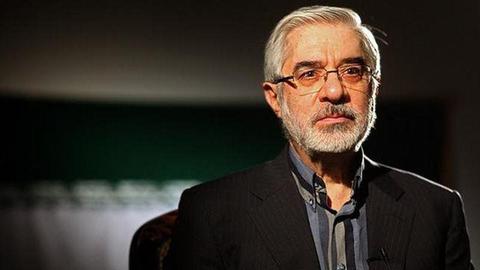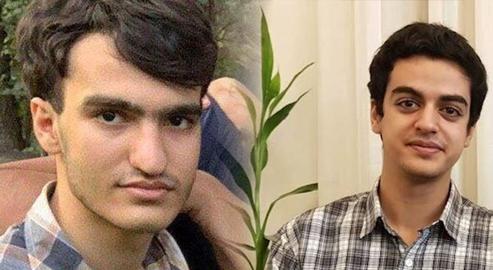The horrors of Iran’s 1988 prison massacre are so profound that more than three decades on, it continues to be an important focus, not only for the victims' families, but also for campaigners, the media, and people who believe that Iranians must know about one of the most shocking events in contemporary Iranian history.
For years the Islamic Republic believed it had successfully kept the mass execution of thousands of political prisoners in the summer of 1988 a secret. Over the years, it has become impossible for it to keep up the lies. The families of the victims continue to talk about it, determined not to let the atrocity pass into forgotten history. Every year they gather around the mass graves where their loved ones are buried.
On August 10, 2016, the office representing the late Ayatollah Hossein Ali Montazeri released an audio file of a meeting he attended with members of the revolutionary death panel in August 1988. At the time, Montazeri was still the designated heir to Ayatollah Khomeini, the founder of the Islamic Republic. The audio file made waves across social media and ensured the massacre once again became a public topic of discussion.
The death panel was comprised of Hossein Ali Nayri, a religious legal expert, Morteza Eshraghi, Tehran’s prosecutor, Mostafa Pourmohammadi, the Ministry of Intelligence's representative to Evin Prison and deputy prosecutor Ebrahim Raeesi.
Four years on from the release of the clip, Raeesi is the chief justice of the Islamic Republic, after being appointed in 2019. Prior to his appointment, he was a candidate in the 2017 presidential election, and because he featured in Montazeri’s audio file, the 1988 massacre made its way into electoral campaigns and debates. Even Hassan Rouhani, who was running for reelection, implicitly said that the only thing that Raeesi knew how to do was execute people.
Mir Hossein Mousavi, who has been under house arrest for 10 years following the disputed 2009 presidential election, was the prime minister at the time of the massacre. So it should come as no surprise that many people have been wondering whether he knew about the death panel and the executions, and whether he did anything (or nothing) to prevent it. Or could it have been a secret kept even from him?
Did he Know?
In August 1988, Amnesty International sent a letter about the execution of the political prisoners to the government of the Islamic Republic. As a result, the organization argues, Mir Hossein Mousavi, who was prime minister at the time, could not have been unaware of what was going on. Amnesty International campaigners working on Iran say this document can still be referred to today.
The document was originally published two years ago, but Amnesty published it again in 2020, along with a video of an interview with Mousavi at the time. Amnesty campaigners accuse Mousavi of “denial and justification of the 1988 massacre.”
“The People’s Mojahedin Organization [MEK, an opposition group] committed a vast number of killings and lootings in Iran and we had to crush this conspiracy,” Mousavi said in the interview with an Austrian TV network. “Because of this we did not show any mercy. Our government cannot refuse to defend itself.”
For some time these statements by Mousavi were interpreted to mean that he had been aware of the 1988 massacre. But a short while ago, a more complete version of the video was released showing that Mousavi was actually referring not to the massacre but to Operation Mersad in July 1988, the last major military operation of the Iran–Iraq War, which ended in victory for Iran. The operation was a counterattack against about 7,000 members of the People’s Mojahedin Organization who were armed, equipped and given air support by Saddam Hussein’s Iraq.
American-Iranian human rights lawyer Elahé Sharifpour-Hicks says that Amnesty International’s letter was drawn up and sent by her husband Neil Hicks in 1988. Quoting Mr Hicks, she tweeted: “at the time nobody in the organization was sure that the letter had been received by the Islamic Republic officials.”
Prior to this, Ann Harrison, former Deputy Director of Amnesty International for Middle East and North Africa affairs, had said of the video interview: “We can’t hear exactly what he was asked, nor his precise reply so I think it is difficult to say categorically that Mousavi denied or justified the 1988 prison massacre — but also it cannot be ruled out that he did.”
Currently there is no evidence to prove incontrovertibly whether, in 1988, Mir Hossein Mousavi knew about the massacre beforehand or not. However, the director of Iran’s desk at Amnesty International says that even before the letter was sent, families of the prisoners had gathered outside the prime minister’s office, so it seems impossible that he knew nothing about what was going on inside the prisons. It makes it more difficult to defend Mousavi by saying that he was unaware of the massacre.
Was This the First time?
Before his house arrest, an audio file was released online in which Mousavi says that Ayatollah Khamenei, who was president at the time, talked about the massacre a few days after it took place during a meeting of the heads of the three branches of government. In the audio file, Mousavi quotes Khamenei as saying that the crime disgraces the entire regime.
Mousavi says that in this meeting the names of a number of victims were mentioned and adds that some of them were his own friends and acquaintances and did not deserve to be executed. He calls the events in the summer of 1988 “ugly” and “criminal.” Could this have been the first time Mousavi had heard of the massacre of political prisoners?
It also remains unknown when Khamenei, who reported the prison massacres during the meeting, learned about them. The same goes for Akbar Hashemi Rafsanjani, who was then speaker of the parliament, and Abdolkarim Mousavi Ardebili, head of the judiciary. When did they learn about the crime and what did they do about it?
In the audio clip, Mousavi states that his comments were not for publication. He warned that disclosure about the 1988 massacre had to be done very carefully and that it was like opening a can of worms. This shows that, at least at the time, Mousavi believed that disclosing the details about the massacre was not in the interest of the Islamic Republic regime. Mousavi adds that Ayatollah Khomeini and the Islamic Republic must not be held accountable for the massacre. He clearly defends his own interests.
The audio clip suggests that Mousavi still had serious reservations about revealing unknown secrets of the massacre. But, using the clip of the Austrian TV network interview and the Amnesty International letter to the Islamic Republic government as the only existing evidence, it is impossible to make a definite judgment about his role in the massacre and rule on whether he is guilty or innocent when it comes to his knowledge of the events.
History Shall Judge, But we Need Evidence Now
Today, the question before the Iranians wanting justice — the families of the victims but also many others — is how to prosecute anyone who was involved in the massacre and how this justice can be administered. In addition, it is important to inform the public and the current generation about the events of 1988 and other crimes committed throughout the history of contemporary Iran so that such events will not happen again. It is important, for instance, that people are aware, thanks to the 2016 release of the audio clip, that Ayatollah Montazeri had told the death panel that if the executions took place, Khomeini would go down in history as a “bloodthirsty murderer.” This demonstrates to the public that Khomeini had supported the executions and, to a large degree, this enabled the public to pass judgment on both Khomeini and Montazeri, who was dismissed from his position as the Deputy Supreme Leader for his continued opposition to such actions.
When they were alive, the public had no grounds to judge either Khomeini or Montazeri on such questions. Even if there is no chance to prosecute the suspects as long as they are alive, eventually people will be able to judge them at a juncture in history. So it makes ethical sense for people who are still alive, and who know about the event and have respect for the process of judging history to step forward and publish evidence for this historical crime.
Related Coverage:
Justice at Last? 1988 Massacre Suspect Arrested in Sweden, 14 November 2019
Iran Destroying Graves from 1988 Executions, 30 April 2018
My Father, the 1988 Massacre and the Need for Truth, 5 April 2017
“The Skeletons in These Graves Could Change the Future”, 27 October 2016
Iran Still Haunted by its “Biggest Crime”: the 1988 Prison Massacre, 15 September 2016
Montazeri and the 1988 Massacre of Prisoners, 12 August 2016
1988: The Crime that Won't Go Away, 3 August 2017
visit the accountability section
In this section of Iran Wire, you can contact the officials and launch your campaign for various problems




























comments